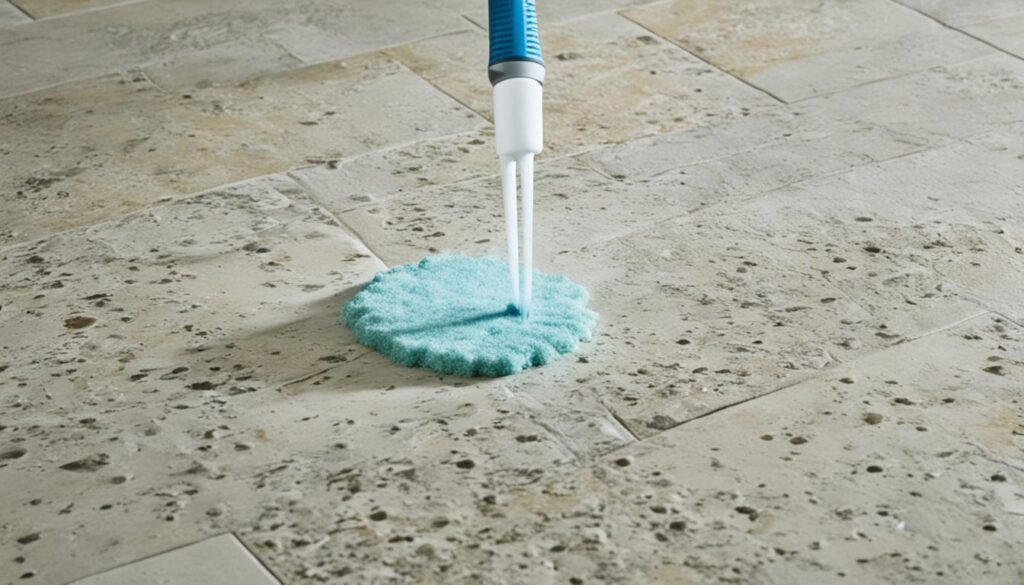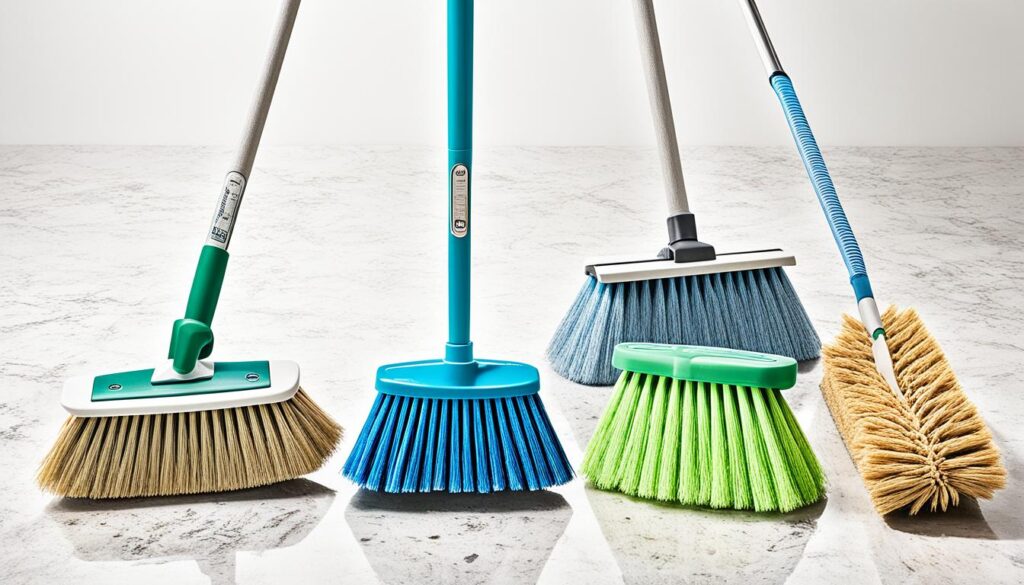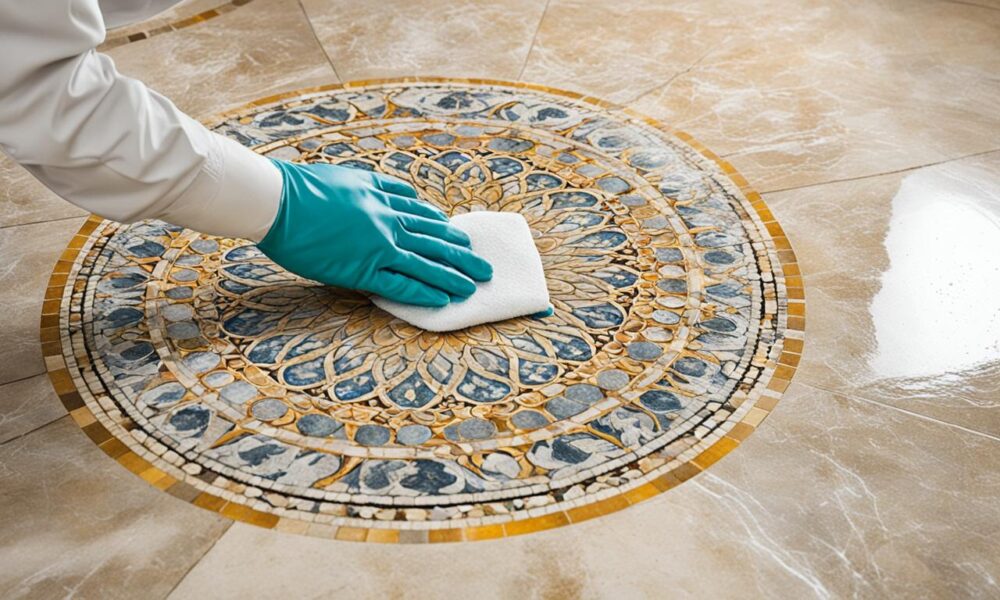Maintain Natural Stone Flooring Elegance & Shine
Natural stone floors are both durable and elegant. However, they need the right care to keep their beauty. Start by sweeping the floor regularly to get rid of dirt and debris. This prevents a harmful layer of dust.
When it comes to cleaning, consider the area’s use. Places with more people or pets will need more cleaning. Use a soft brush on your vacuum to keep the stone safe. It helps remove dust from hard-to-reach places without causing scratches.
Choosing the right cleaning products is critical. Avoid harsh chemicals as they can harm the stone. Instead, use cleaners like Granite Gold® Stone & Tile Floor Cleaner. This cleaner comes with a soft-bristle brush to protect your floor.
Mopping is important too. Make sure your mop is damp, but not wet, when you clean. This traps dirt effectively. After cleaning, seal your floor with a product like Granite Gold® Sealer. This adds a layer of protection. It keeps your floor looking good longer.
Key Takeaways
- Regular sweeping and dust mopping is essential for stone floor care to prevent scratches and wear.
- Vacuuming with a soft brush attachment removes dust effectively without damaging the stone flooring.
- Using pH-neutral cleaners such as Granite Gold® Stone & Tile Floor Cleaner preserves the surface.
- Mopping with a damp mop is key to effective natural stone maintenance, ensuring cleanliness without residue.
- Applying a quality stone sealer like Granite Gold® Sealer extends the longevity of the flooring, keeping it beautiful.
Understanding the Nature of Natural Stone Flooring
Natural stone floors look elegant and have a unique charm. To keep them beautiful, you need to take special care of them. The first step is to use a dust mop every day. This removes small particles that could scratch the surface. Each type of stone, like marble, granite, or slate, needs different care to stay looking good.
- Granite is very hard and doesn’t scratch easily. It’s great for places with lots of people, such as kitchens or hallways.
- Marble is used in fancy entrances and spaces. It needs gentle care to keep its shiny look.
- Limestone looks more natural. But it’s easily marked by acidic things, so take care to avoid this.
- Slate is good inside and outside because its texture hides small damages.
- Travertine has beautiful patterns but, like limestone, watch out for acids. It needs a good sealer.
Cleaning natural stone with the right products is very important. Use cleaners that are safe for stone. Avoid strong acids or bases like vinegar or lemon juice. These can hurt the stone’s surface. It’s also smart to seal your stone regularly. Sealing helps protect against stains and makes your stone last longer.
Getting advice from professionals who work with stone is a great idea. They can teach you the best ways to keep your floors looking new. By taking good care, your natural stone floors can last a very long time. They’ll keep their beauty and strength.
“Regular cleaning with pH-neutral stone cleaners is crucial in preventing the deterioration of natural stone surfaces.”
| Stone Type | Durability | Ideal Use |
|---|---|---|
| Granite | High | High-traffic areas |
| Marble | Medium | Grand entrances |
| Limestone | Low | Interior design |
| Slate | High | Interior/Exterior |
| Travertine | Medium | Decorative surfaces |
How often you clean your stone floors depends on several things. This includes how much you walk on them and the stone type. Placing doormats or rugs by the door can really help. It keeps dirt off your floors. With regular cleaning and good advice, your stone floors will look great for many years.
Regular Cleaning Practices
Keeping natural stone floors in top shape starts with the right cleaning. It’s key to use proper methods and products. Doing so maintains the stone’s look and keeps it safe from harm.
Daily Sweeping and Dust Mopping
Regular sweeping or dust mopping is crucial for stone floors. It removes dirt and debris that might scratch the surface. Always use a soft-bristle broom or a microfiber mop made for these floors to avoid damage.
Choosing the Right Cleaning Products
For selecting stone-friendly cleaners, opt for pH-neutral items. Harsh cleaners can cause discoloration and etching, especially on marble or limestone. Granite Gold® and StoneTech® make cleaners just for natural stone.
Proper Mopping Techniques
Good stone floor mopping is essential for a clean floor that is well cared for. Instead of hot water, use a damp mop to avoid color change in the stone. This way traps dirt effectively, keeping the floor free from residue.
| Practice | Benefit |
|---|---|
| Daily Sweeping or Dust Mopping | Removes dirt and prevents scratches |
| Selecting Stone-Friendly Cleaners | Prevents etching and discoloration |
| Proper Mopping Techniques | Effective dirt removal without residue |
Avoiding Harmful Cleaners
Protecting natural stone from harmful cleaners is essential. This keeps its beauty and strength intact. Marble floors are easily scratched and stained. They need special care to shine. Travertine is also tricky because it’s porous and reacts to acids.

Cleaning surfaces with the wrong materials can ruin them. Using bleach, ammonia, or acidic natural cleaners is bad for stone. These can warp the surface, leaving marks or changing the color. Instead, use gentle cleaners that match the stone’s pH level. This keeps your stone strong and shiny.
When spills happen, clean them up right away. This is crucial for floors like limestone and granite. Limestone can stain and chip easily by moisture. Granite, on the other hand, is tough but still needs care. Regular cleaning and sealing your floors will make them last longer.
“The best way to care for natural stone flooring is by employing the right cleaning techniques and products, ensuring its beauty lasts for years to come.”
To avoid damage, go for pH-neutral cleaners. Dust mop often and use furniture pads under heavy things. Reseal your floors periodically to stop water and oil stains. These steps guard your stones against harm.
Always keep an eye on your stones. They require periodic checks and care. By knowing each stone type’s needs and acting accordingly, your floors will stay beautiful. This way, they remain a highlight of your home.
How to Maintain the Beauty of Your Natural Stone Flooring
To keep your stone floors beautiful, start with regular cleaning. Use a clean dust mop often to remove grit and sand. These can scratch the floor’s surface. Make sure your vacuum’s attachments are safe to avoid damage.
Sealing your stone floors is key. They are usually sealed when installed. But, you should reseal every six months. Pick the right sealant to protect against stains and damage.
Dealing with spills fast is important. Blot up spills like red wine right away. Using coasters and trivets helps prevent stains and keeps your floor looking new.
Take care when moving furniture. Put felt under furniture legs to avoid scratches. It’s also a good idea to get professional maintenance from time to time to keep your floor in top shape.
It’s an ongoing effort to keep stone floors looking good. With regular cleaning, timely sealings, and quick spill cleanups, your floor will last for years. This not only makes them beautiful but also ensures their longevity.
Effective Stain Management Techniques
Keeping natural stone floors looking great means dealing with spills fast. You must use the right methods to treat hard-to-remove stains.
Immediate Spill Response
Acting quickly with spills on natural stone is key. Dab the spill with a soft cloth to stop it from penetrating the stone. Do this especially with acidic liquids like red wine or lemon juice to avoid stains. Always have something absorbent nearby for these accidents.
Treating Stains with Poultices
Poultices are great for removing tough stains from stone. Make a paste of baking soda and water, then apply it to the stain. Cover this with plastic and let it sit for a day or two. This method pulls the stain out of the stone. Finally, clean the area with a mild cleaner to finish.
It’s suggested to reseal natural stone tiles every 3-5 years in busy areas. For places like kitchens and bathrooms, this step is even more important. It helps prevent stains and keeps your floors looking new. Adjust how often you do this based on how much the area is used. With regular care, natural stone will stay beautiful and last a long time.
The Importance of Sealing Your Stone Floors
Sealing your natural stone floors is crucial. It creates a barrier that helps keep your stone safe from stains and damage. This practice boosts the stone’s ability to fight off moisture, stains, and other issues.
Sir Grout and other pros say sealing is a must. They use a 275-degree steam treatment to clean. Then, they apply sealant for a strong protection.
Sealing natural stone and tile is crucial to preventing future stains and dirt build-up.
The sealing needs differ based on the stone and where it’s used. For example, busy areas like kitchens need more frequent sealing. Sealing is affordable and should be done twice a year for stones like marble. But, granite and quartz only need it annually.
Here’s a look at how often you should seal different stones:
| Stone Type | Sealing Frequency |
|---|---|
| Marble, Onyx, Limestone | Every six months |
| Granite, Quartz | Once a year |
| Impregnating Sealants | Every one to three years |
Sir Grout provides many sealant options, including 30 color tints. This allows for grout color updates while protecting the surface. The process usually takes just one day, which is very convenient.
Sir Grout also has a maintenance program. It extends the sealant’s warranty, making upkeep easier. This saves time and effort in the long run.
Specialized Care for Different Stone Types
Every natural stone floor type has its own way of staying beautiful. It’s important to know how to take care of marble, limestone, travertine, granite, and slate. This knowledge will help keep them both stunning and strong for a long time.
Marble, Limestone, and Travertine Care
Caring for marble, limestone, and travertine means cleaning carefully and sealing often. These stones can get stained easily, so clean up spills right away. Always use cleaners that are safe for stone to prevent damage. Putting a sealer on them helps guard against stains and wear, and it makes them shine more.
Granite Maintenance
Granite is tough, perfect for busy spots in your home. But, it still needs special care. Sealing it now and then will protect it from spills and keep it looking great. Clean granite only with safe, neutral cleaners to ensure its longevity.
Slate Flooring Care
Slate is great at hiding flaws, but it requires regular attention. Sealing it often makes it easier to keep clean and nice. Use cleaners without strong acids to preserve its beauty. It’s best not to mix different kinds of stones to avoid complicated care. With the right care, slate floors will look good and stay strong.
For more detailed information on how to maintain each type of natural stone, visit this comprehensive guide on natural stone care.
Preventing Scratches and Damage
To keep natural stone floors looking great, take steps to prevent damage. Use non-slip mats in busy areas to stop scratches from too much foot traffic. Put felt pads under furniture legs to avoid accidental scratches when moving things.
- Non-slip mats: Essential for areas with heavy foot traffic.
- Felt pads under furniture: Prevent scratching when moving furniture.
- Gentle handling of heavy objects: Minimize the chance of cracks and chips.
To avoid scratches, select the right cleaning tools and methods. Always sweep or vacuum with a soft brush to remove harmful particles. Marble and limestone scratch easily, while granite and slate are tougher. But, they all need careful attention.
Quickly deal with spills and stains for good floor care. Liquids can soak in and stain porous stones if not addressed fast. Use cleaners that are safe for natural stone to keep the floor looking its best. By following these steps, you can maintain the beauty and function of your floors over time.
Using the Right Cleaning Tools
To keep natural stone floors beautiful and strong, choosing the right cleaning tools is key. It’s critical to use tools that are safe for the stone to prevent any damage.
- String Mops: Ideal for effectively capturing dust and debris without being abrasive to the stone surface.
- Sponge Mops: Gentle yet efficient in ensuring thorough cleaning while keeping the delicate stone surface free from damage.

Choose mops and cloths made for stone cleaning to protect your floors. Soft brushes for grout and non-abrasive, stone-friendly brushes are best. Dust mop your stone floors often to keep them from getting scratched by sandy or dirty particles.
“Dust mopping natural stone floors frequently helps prevent damage from abrasive sand, dirt, and grit, ensuring longevity and appealing look of the flooring.”
| Tool | Features | Best For |
|---|---|---|
| String Mop | Gentle on surfaces; effective dust collection | General cleaning |
| Sponge Mop | Absorbent; non-abrasive | Regular mopping |
| Soft Grout Brush | Non-abrasive; specialized design | Cleaning grout |
Using the right cleaning tools for your stone floors keeps them looking great. It also helps them last longer, which is good for your home.
The Role of Professional Maintenance
Keeping your natural stone floors beautiful and long-lasting is key. It’s complex to care for marble, granite, and more. That’s why experts like Modern Stone Care are crucial. Their services use top-notch methods and products. This keeps every type of stone looking perfect.
Your stony surfaces need sealing when first put in. This stops stains well. It’s good to reseal every few years as the maker suggests. Sealing types include those that go inside the stone and those that make it look richer.
Regular pro care keeps your stone floors and counters stunning, and saves you from hefty fixes. You should act fast on spills and always protect the stone. In Houston, Modern Stone Care’s help is personalized. They give solid advice and are serious about keeping your stone spotless, a wise choice for those with stone flooring.



